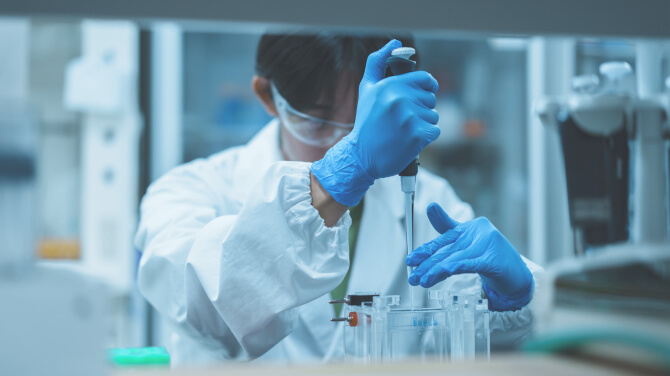Master Program - Division of Pharmaceutical Sciences


Philosophy and Policy
[Basic policy on certification of completion and conferment of degrees]
The objective of this course is to nurture students who will have acquired research capabilities in an academic field of pharmaceutical sciences.
Students are required to receive the necessary research guidance, complete lectures, earn at least the prescribed number of credits, and meet the prescribed standards for the English proficiency test. A master's degree (Pharmaceutical Sciences) is awarded to students who have passed the QE (Qualifying Examination), the master's thesis, or the outcomes of research concerning a specific subject, as well as oral presentations and discussion.
[Qualities and abilities that students must acquire]
- Acquire an ethical approach, knowledge to a wide range of basic and applied fields and the high research ability required to be a drug discovery researcher.
- Acquire an international perspective and English proficiency to be able to play an active role in the international community.
- Have a desire and an attitude for self-improvement and to be able to carry out drug discovery research from the formulation of a research problem to its solution using a wide range of knowledge and high research ability.
[Basic policy on the curriculum]
In this course, a curriculum structure with a hierarchical and multi-track structure is adopted in order to cultivate a wide range of knowledge and research capabilities from basic to applied research in academic fields with pharmaceutical sciences at the core.
[Basic policy on the educational content and educational methods (curriculum implementation)]
1. Educational content
- Acquire an ethical approach, knowledge to a wide range of basic to applied fields, and cutting-edge specialized knowledge and skills in specific fields required for carrying out research projects.
- Acquire English proficiency to be able to play an active role in the international community and cultivate reading comprehension, and skills in explanation, information collection, discussion and communication.
- Through cutting-edge knowledge and research activities, students will acquire the ability to carry out studies from the formulation of a problem setting to its solution.
2. Teaching method
- In order to acquire a wide range of knowledge in the early stages of the course, and to gradually acquire cutting-edge knowledge in specific fields, the lectures are arranged in a hierarchical manner, starting with Essential GS Courses, consisting of “Introduction,” “Advanced Courses,” “Experimental Techniques,” and “Advanced Seminars.” In addition, a group of courses spanning the three fields of "Pharmachemistry," "Biopharmaceutical Science," and "Precision Medicine" is provided after "Introduction."
- In order to cultivate a wide range of knowledge, an international perspective, proficiency in English, information collection skills, and communication ability that can be used in the international community, we will offer specialized English courses, classes held in English, and "Free study framework."
- "Exercises" and "Practical Training" courses are arranged in order to develop the ability to solve new problems through exercises and research activities in specialized fields.
[Evaluation of learning outcomes]
- Standards and methods for evaluating learning outcomes are indicated in the syllabus for each course.
- The three qualities and abilities listed in the Diploma Policy will be evaluated through examinations and reports in lectures, exercises, practical training, and free study framework courses.
- Comprehensive evaluation of academic achievements will be conducted by Qualifying Examination (QE), master's thesis, or the outcomes of research concerning a specific subject, as well as oral presentations and discussion.
The objective of this course is to produce scientists having a broad knowledge and research capabilities ranging from basic to applied drug discovery science with an international perspective. Through education/basic research focusing on the chemical, physical, and biological aspects of various physiologically active substances including pharmaceutical products, outstanding scientists who can contribute to the life sciences in general, including drug discovery, will be trained. Specifically, we will produce personnel who will play an active role as company researchers, academic researchers, and medical representatives (MRs) in pharmaceutical, chemical, and food-related industries; researchers in public institutions; and government officials in the fields of medical care, health and welfare, pharmaceutical affairs, and environmental sciences. Those who have the motivation and qualification to work in these fields in the future, regardless of the department from which they have graduated, will be accepted.
The basic policy for selecting students for admission will be to focus on those with a certain level of academic proficiency (academic major and English skills) and have a strong intention to work actively in the aforementioned fields in the future. In the selection process, basic academic and English proficiency, logical thinking ability, and the ability to express themselves will be comprehensively assessed through examinations and interviews.